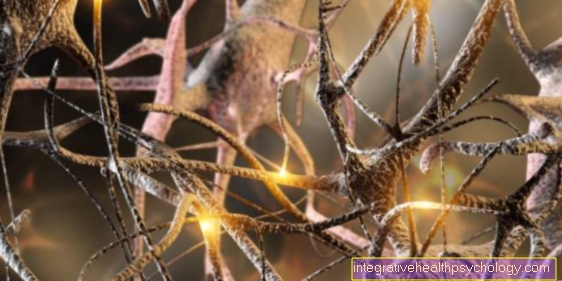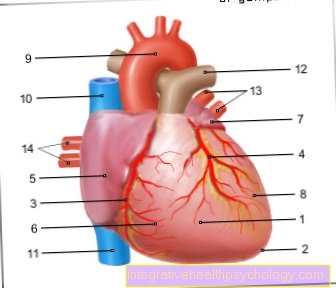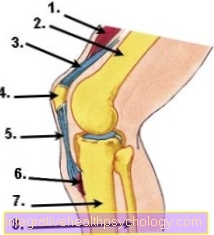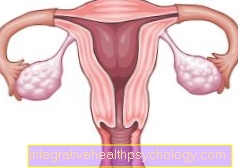Dizziness, nausea and headache
Definition- what is dizziness with nausea and headache?
Dizziness with nausea and headache are three symptoms that occur in combination. The symptoms can express themselves to different degrees and with different characters. One also speaks of general symptoms, as they are often very unspecific. They can also be mutually dependent, which means that, for example, dizziness comes first and the resulting drowsiness leads to nausea and headaches.
There are various possible causes, often the reason is harmless. However, if dizziness with nausea and headache occurs more often, a doctor should be consulted for clarification.

causes
There are various possible causes for dizziness with nausea and headaches. One also speaks of general symptoms, as they are often very unspecific and are considered a general expression of stress on the body.
For example, dizziness, nausea and headaches often occur with infections. These include both harmless causes, such as a flu infection or gastrointestinal infection, but also more serious infectious diseases. Another very common cause is psychological stress, which manifests itself as physical stress through these symptoms. Medicines can also cause dizziness, nausea, and headaches as side effects. Fluctuations in blood pressure, blood sugar or hormones, for example from the thyroid, can also be associated with these symptoms. Temporary or permanent circulatory disorders of the brain are also possible causes. The more serious and far less common causes include tumor diseases, brain injuries or poisoning.
The dizziness and nausea can also be accompanying symptoms of the headache. This is the case with migraines, for example, but also with headaches caused by medication. Headaches and nausea can also accompany dizziness caused by a disease of the organ of equilibrium. Even in extreme heat, dizziness often occurs, which can be accompanied by headaches and nausea.
Mental causes
There are various psychological causes that lead to dizziness, nausea and headaches. In addition to fatigue and sleep disorders, these symptoms are often found in depression, for example. But even in the so-called burnout syndrome, these symptoms are an expression of excessive stress on the body. Fears and anxiety disorders can also manifest themselves in the form of dizziness, nausea and headaches. They then mainly occur in the more acute phases of fear.
Read more on the topic: Burnout syndrome
stress
A very common cause of dizziness, nausea, and headaches is stress.Mental stress often manifests itself through physical symptoms. The symptoms are often associated with insomnia or a lack of sleep. Those affected are not always aware of the psychological stress or its extent. Burnout syndrome is an extreme form. This leads to excessive stress, which manifests itself through pronounced physical symptoms such as dizziness, nausea, headache, but also fatigue and exhaustion.
Also read the article on the topic: Dizziness from stress
diagnosis
The diagnosis of dizziness, nausea and headache is mainly based on the anamnesis, i.e. the doctor-patient conversation. It is important to clarify the nature of the symptoms and the timing of their occurrence. This enables an attempt to be made to determine the cause.
A certain suspicion can then be confirmed or refuted accordingly through further investigations. Various methods can be used for this. If the causes of dizziness, nausea and headaches are unclear, a diary to document the symptoms may be helpful.
Concomitant symptoms
Dizziness, nausea and headache are also often referred to as general symptoms, as they are a general expression of physical exhaustion. This also includes vomiting, abdominal pain, exhaustion, tiredness and fatigue. Other accompanying symptoms can vary widely depending on the underlying cause. For example, a flu-like infection can lead to fever, coughing and runny nose. Fluctuations in thyroid hormones, on the other hand, can also lead to sweating and arrhythmias in the heart, for example.
Pressure in the ears
A possible accompanying symptom with dizziness, nausea and headache can be a noticeable pressure in the ears. This suggests that the cause lies in a disorder of the organ of equilibrium. Menière's disease, for example, can be considered for this. This leads to an increase in fluid in the equilibrium organ, which can lead to a feeling of pressure in the ears. Other symptoms can include ringing in the ears or hearing problems. The resulting dizziness is usually described as vertigo and often leads to nausea and headaches. Depending on the severity and type of accompanying symptoms, other causes should also be considered.
Also read the articles on the topic: Balance disorder and dizziness, vertigo
fatigue
If dizziness, nausea and headaches occur together with fatigue, there are various possible causes. These symptoms in combination are typical of a flu-like infection, for example a virus flu. Gastrointestinal infections can also be associated with these symptoms. The symptoms are also often an expression of physical overload and sleep disorders or lack of sleep. If this persists over a longer period of time, however, a doctor should be consulted for clarification.
Racing heart
If dizziness, nausea and headache are accompanied by a racing heart and the perception of a heartbeat that is too fast, the cause is often a disturbance in the body's circulation. Circulatory problems are mostly caused by incorrect regulation of blood pressure, often too low blood pressure. This can also lead to tremors and sweating. Other possible causes are disorders of the function of the heart, such as cardiac arrhythmias. Chronic heart disease can also be a trigger.
Read more on the topic: Causes of palpitations
Visual impairment
Visual disturbances can be accompanied by dizziness, nausea, and headaches. This is the case, for example, with migraines, which can be accompanied by typical pulsating headaches, nausea, vomiting and dizziness. The visual disturbances usually occur before the migraine in the context of the so-called aura and are expressed in the form of the perception of lightning or other forms.
For more information, see: migraine
Much rarer, but more dangerous, is increased intracranial pressure as the cause. This puts pressure on the optic nerve, which leads to impaired vision, dizziness, nausea, vomiting and headaches.
Read more on the topic: Increased intracranial pressure- signs, causes, and treatment
diarrhea
Another common symptom with dizziness, nausea and headache is diarrhea. Usually the cause is a digestive tract disorder, for example a gastrointestinal infection. This can be caused by various bacteria and viruses. Often these are quite harmless infections that subside by themselves after a few days. Other digestive system complaints such as abdominal pain, vomiting or constipation often occur. The dizziness and headache are general symptoms of stress on the body.
This article might also interest you: These symptoms will tell you that you have gastrointestinal flu
Abdominal pain
Abdominal pain combined with dizziness, nausea and headache are often general symptoms associated with your period. However, these symptoms can also be signs of a possibly existing pregnancy. If they persist for a longer period of time or if additional symptoms occur, this should be clarified by a doctor if necessary. One of the more serious causes is, for example, inflammation of the appendix, which usually needs to be treated quickly. If, for example, increased or bloody discharge occurs at the same time, the cause is e.g. a disease of the uterus in question.
Blood pressure
A disturbance in blood pressure is often associated with dizziness, nausea and headaches. For example, blood pressure that is too low is often associated with circulatory problems. In the case of pronounced circulatory problems, brief fainting spells occasionally occur, in which the person concerned loses consciousness for a few seconds.
Excessive blood pressure can also manifest itself through dizziness, nausea and headaches. The headaches are often in the back of the head and occur mainly in the morning. However, a disturbance in blood pressure can only be a symptom, which is why any other cause must be ruled out.
Sweating
If sweating occurs in addition to dizziness, nausea, and headaches, there are several possible causes. A disturbance of the circulatory system often manifests itself through these symptoms, especially with heavy physical exertion or a rapid change in body position.
A disease of the balance organ can also be the cause. Occasionally, the symptoms can also reflect a stroke. In most cases, however, other symptoms also occur, such as language disorders, disorders of sensitive perception or short-term paralysis.
For more information, see: Sweating
Epistaxis
A nosebleed that occurs at the same time as dizziness, nausea and headache can have a number of causes. For example, if you have a cold, you may experience nosebleeds. The reason for this is the irritation of the mucous membranes, which can also be present regardless of the common cold. Again and again these symptoms are an expression of high blood pressure. It usually occurs suddenly and can be accompanied by other symptoms such as sleep disorders or neck pain.
Course of disease
The course of dizziness, nausea and headache depends to a large extent on the underlying cause. Generally speaking, the symptoms are not infrequently the expression of an acute stress reaction and accordingly subside after a period of rest. If the cause is a chronic disease, such as high blood pressure, it can usually be treated well if it is detected early. Accordingly, the course of the disease is also rather mild. The symptoms rarely indicate serious and complex diseases.
Dizziness, nausea, headaches during pregnancy - is it dangerous?
Dizziness, nausea, and headache that occur together during pregnancy can have different causes. Again, these symptoms can be the expression of more harmless triggers, such as stress. Especially at the beginning of pregnancy, dizziness with accompanying headaches and nausea is not uncommon. This is due to the change in the body's circulatory system, as the blood is now also required to supply the growing fetus.
However, the symptoms can also be signs of medical conditions that can occur during pregnancy. So-called gestational diabetes, i.e. diabetes mellitus that occurs during the first pregnancy, can lead to circulatory disorders and the corresponding symptoms. It is important to pay attention to certain risk factors, such as diabetes in the family, in order to watch out for warning signs. If gestational diabetes is detected early, diet can be adjusted accordingly to prevent complications.
Find out more about the topic: Gestational diabetes
Disturbances in blood pressure during pregnancy can also lead to dizziness, nausea and headaches. In this context, the symptoms can be a warning sign of what is known as eclampsia. This leads to seizures that occur during pregnancy and can be dangerous for the mother and child. Often there are other symptoms in advance, such as visual disturbances, sensitivity to light and noise, and cramps.
Find out more about the topic: Pregnancy Hypertension- Is It Dangerous?
Treatment / therapy
Treatment for dizziness, nausea, and headache depends on the triggering cause. If the cause is, for example, a blood sugar disorder, this must be adjusted accordingly with insulin or antidiabetic drugs. High blood pressure can also be treated with various medications.
In general, there are various medications available for the relief of acute symptoms. Common remedies for headaches include pain relievers such as aspirin, ibuprofen and diclofenac, which are also known as non-steroidal anti-inflammatory drugs. Metoclopramide or Vomex, for example, help against acute nausea. The latter is also available as Vertigo-Vomex, which also combats dizziness. Medicines such as dimenhydrinate can also reduce dizziness.
Furthermore, attention should be paid to a healthy and balanced lifestyle. This includes sufficient exercise and fresh air, as well as a healthy diet to prevent stress and excessive strain and to stabilize the circulation.
Also read the article on the topic: Home remedies for dizziness
Duration / forecast
The duration of symptoms of dizziness, nausea, and headache can vary widely, depending on the cause. Usually they appear only temporarily and as an expression of physical or psychological stress. In the case of a migraine, which in addition to the typical throbbing one-sided headache is also accompanied by nausea and dizziness, these symptoms can persist for several days. The dizziness can persist for a few days after the end of a migraine attack, for example.
The prognosis for dizziness, headaches and nausea is usually good, as the causes are mostly harmless. In rare cases, the symptoms are signs of more serious illnesses with associated complications.





























